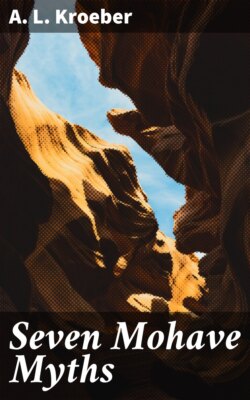Читать книгу Seven Mohave Myths - A. L. Kroeber - Страница 9
На сайте Литреса книга снята с продажи.
B. Two Brothers Go Off
Оглавление1b. Now there were two brothers there. They stood east of the house and told of it. They did not speak, but sang. They sang of its posts, the rafters, the sand heaped around and over it, and the other parts. (4 songs.)
2. Their names were Pukehane, the older, and Tšitšuvare, the younger.[4] They went north a short distance, where there was a little gravelly place and thorny cactus. The ground-squirrel, hum'ire, lived there. When the two brothers came, it ran away, crying like a boy. It had never seen them before. They stood there and sang about it. (3 songs.)
[4] Both names refer to cane. Hipūke is the "end of the root" or butt. Hipūke-hane is probably the full form. Tšitšu-vāre is said to refer to the points of the cane. In the text, ū and ā have been rendered u and a in these two names.
3. Then they went north again a very little distance.[5] There they saw a rat, hamalyk. They did not kill it, but looked at it and sang about it. (2 songs.)
[5] "About 50 yards," not far enough to necessitate a new name for the place.
4. Now it was sundown. They struck their fire-flints,[6] made a fire, and sat by it. They did not eat anything all night. In the morning they were hungry. One thought that they should kill the rat and eat it. His brother said: "That is good." So they killed the rat and ate it. They stayed there that day, thinking. The next day, in the morning, Pukehane, the older brother, said: "We have no place to live." Tšitšuvare said: "Yes, that is true. Where can we get wood to build a house?" Now Pukehane was intelligent; he was born thus. Therefore he made sticks out of his saliva.[7] Thus in one day they built a round house. At night they went into it. (3 songs.)
[6] Like wheat, cloth, etc., a Spanish absorption integrated into the culture.
[7] Hika, his saliva, important element in magic and therapeutics.
5. Now it was three days.[8] In the morning they hunted rats. When they killed a rat, they hung it by its head under their belts. Pukehane said: "I do not think this is good." Then he took[9] two net-sacks,[10] and they put the rats into them and carried them on their backs. At sunset they came back to the house. Now two men lived at Avikwame, Hatpa-'aqwaoθtše,[11] their father's older brother, and Nume-peta.[12] Hatpa-'aqwaoθtše said: "I will live with my younger brother's sons (ivitk). I will not live with this man (Nume-peta) who is not my relative." And he came and lived with them. So they were three. In the morning, the two boys went hunting rats again. As the rats were shot, they squeaked. The boys stood and listened and laughed. (1 song.)
[8] One day since leaving Avikwame they had spent in thinking, a second in building the house, this is the third.
[9] Created by magic out of nothing, by reaching out.
[10] Mayu, carrying-sacks of net-work such as the Paiute and Chemehuevi use.
[11] Hatpa. Pima; aqwaθ-, yellow. The second part of the name is not certain.
[12] Or Numê-t-veta. Nume is the wildcat; nume-ta, the jaguar.
6. When they came back, Pukehane said, "Some tribes after a time will do like this: let me see how far you can shoot." They bet their arrows. The elder shot far. The younger did not shoot far and lost, lost all his arrows. The quiver was empty and he tied it around his waist. He said, "I will bet the rats that I killed." Then he lost all his rats. They came home and he had no arrows and no rats, only his bow. Their father's older brother saw them. He said, "Why do you not do right? This is wrong. Do not do it any more. That is not what I came here for. I came in order that when you go hunting you bring them here and I eat." (1 song.)
7a. Hatpa-'aqwaoθtše said, "We are three men here. I see you two do not sleep but sit and wake. If three men live in a house everything is ready for them when they come home to it. But there is no woman here and that is why there is no wood and water. If you get a woman she will cook." The boys said, "Yes, we will do that." That night Pukehane stretched his hand to the southeast toward the Maricopa and got corn in it. He got much and laid it in the corner of the house. Then he stretched his hand out northeast, toward the Kohoaldja Paiute, and took wheat.[13] Now they had two kinds of food.
[13], [13a] Cf. note 6.
